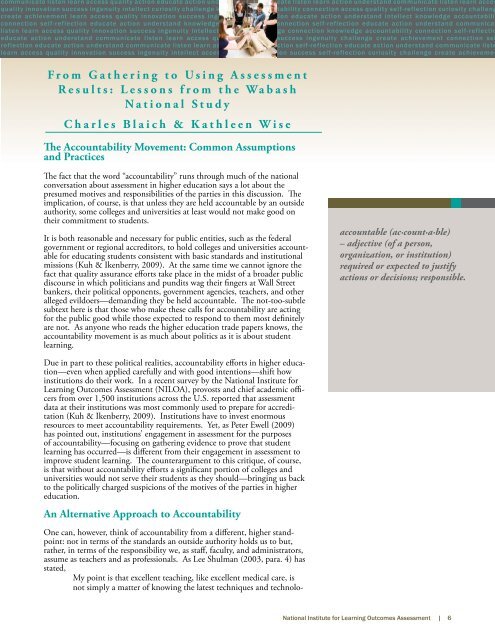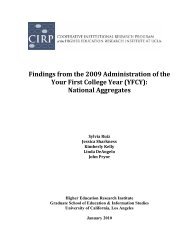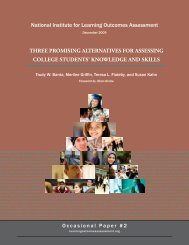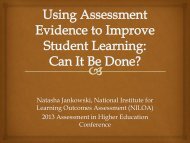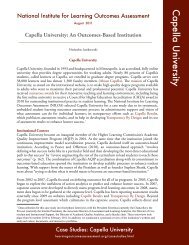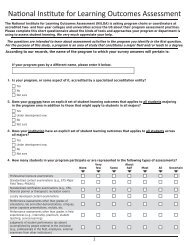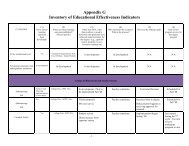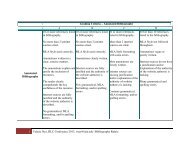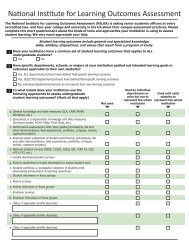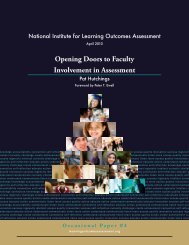F r o m G a t h e r i n g t o U s i n g A s s e s s m e n tR e s u l t s : L e s s o n s f r o m t h e Wa b a s h<strong>National</strong> StudyCharles Blaich & Kathleen WiseThe Accountability Movement: Common Assumptionsand PracticesThe fact that the word “accountability” runs through much of the nationalconversation about assessment in higher education says a lot about thepresumed motives and responsibilities of the parties in this discussion. Theimplication, of course, is that unless they are held accountable by an outsideauthority, some colleges and universities at least would not make good ontheir commitment <strong>to</strong> students.It is both reasonable and necessary <strong>for</strong> public entities, such as the federalgovernment or regional accredi<strong>to</strong>rs, <strong>to</strong> hold colleges and universities accountable<strong>for</strong> educating students consistent with basic standards and institutionalmissions (Kuh & Ikenberry, 2009). At the same time we cannot ignore thefact that quality assurance ef<strong>for</strong>ts take place in the midst of a broader publicdiscourse in which politicians and pundits wag their fingers at Wall Streetbankers, their political opponents, government agencies, teachers, and otheralleged evildoers—demanding they be held accountable. The not-<strong>to</strong>o-subtlesubtext here is that those who make these calls <strong>for</strong> accountability are acting<strong>for</strong> the public good while those expected <strong>to</strong> respond <strong>to</strong> them most definitelyare not. As anyone who reads the higher education trade papers knows, theaccountability movement is as much about politics as it is about studentlearning.accountable (ac·count·a·ble)– adjective (of a person,organization, or institution)required or expected <strong>to</strong> justifyactions or decisions; responsible.Due in part <strong>to</strong> these political realities, accountability ef<strong>for</strong>ts in higher education—evenwhen applied carefully and with good intentions—shift howinstitutions do their work. In a recent survey by the <strong>National</strong> <strong>Institute</strong> <strong>for</strong>Learning Outcomes <strong>Assessment</strong> (NILOA), provosts and chief academic officersfrom over 1,500 institutions across the U.S. reported that assessmentdata at their institutions was most commonly used <strong>to</strong> prepare <strong>for</strong> accreditation(Kuh & Ikenberry, 2009). Institutions have <strong>to</strong> invest enormousresources <strong>to</strong> meet accountability requirements. Yet, as Peter Ewell (2009)has pointed out, institutions’ engagement in assessment <strong>for</strong> the purposesof accountability—focusing on gathering evidence <strong>to</strong> prove that studentlearning has occurred—is different from their engagement in assessment <strong>to</strong>improve student learning. The counterargument <strong>to</strong> this critique, of course,is that without accountability ef<strong>for</strong>ts a significant portion of colleges anduniversities would not serve their students as they should—bringing us back<strong>to</strong> the politically charged suspicions of the motives of the parties in highereducation.An Alternative Approach <strong>to</strong> AccountabilityOne can, however, think of accountability from a different, higher standpoint:not in terms of the standards an outside authority holds us <strong>to</strong> but,rather, in terms of the responsibility we, as staff, faculty, and administra<strong>to</strong>rs,assume as teachers and as professionals. As Lee Shulman (2003, para. 4) hasstated,My point is that excellent teaching, like excellent medical care, isnot simply a matter of knowing the latest techniques and technolo-
gies. Excellence also entails an ethical and moral commitment—what I might call the “pedagogical imperative.” Teachers with thiskind of integrity…inquire in<strong>to</strong> the consequences of their work withstudents. This is an obligation that devolves on individual facultymembers, on programs, on institutions, and even on disciplinarycommunities. A professional actively takes responsibility; she doesnot wait <strong>to</strong> be held accountable.The Association of American Colleges and Universities (AAC&U) and theCouncil <strong>for</strong> Higher Education Accreditation (CHEA) (2008) have also called<strong>for</strong> the higher education community <strong>to</strong> take on this pedagogical imperative:Finally, and perhaps most important, higher education has an obligation<strong>to</strong> our democracy as well as our economy. A college degreeshould ensure that graduates are well prepared <strong>to</strong> contribute <strong>to</strong>society as knowledgeable, engaged, and active citizens. In order <strong>to</strong>meet these challenges, we in the higher education community mustcontinually seek, and find, better ways <strong>to</strong> reach our common goal ofhelping all the students we serve realize their full potential. We need<strong>to</strong> make clear, <strong>for</strong> ourselves and our various constituencies, what ouraims are, how we seek <strong>to</strong> achieve them, and how well we do so. Thisrequires continuing ef<strong>for</strong>ts in many quarters <strong>to</strong> make higher educationa challenging and rigorous experience <strong>for</strong> all students—<strong>for</strong> theirbenefit and society’s as well. To do so, we in higher education mustconstantly moni<strong>to</strong>r the quality of student learning and development,and use the results both <strong>to</strong> improve achievement and <strong>to</strong> demonstratethe value of our work <strong>to</strong> the public. We must not settle <strong>for</strong> anythingless. (p. 1)Yet accountability <strong>for</strong> improving student learning as an enactment of themoral and professional commitments of faculty, staff, and institutions, ratherthan as a reaction <strong>to</strong> externally imposed obligations, is an idea that rarelysurfaces in the public discussion about assessment and accountability.The Wabash College Center of Inquiry and the Wabash<strong>National</strong> StudyThe Center of Inquiry at Wabash College collaborates with institutionsacross the country <strong>to</strong> collect and use evidence <strong>to</strong> improve student learning.At times, our experience working with colleges and universities has shownthe necessary role of external authorities in holding institutions accountable<strong>for</strong> promoting student learning. But hundreds of staff, faculty, students, andadministra<strong>to</strong>rs we have worked with across the country—rather than joiningthe strident fray over assessment and accountability—have taken Shulman’sadmonition <strong>to</strong> heart. In working with these committed professionals, wehave discovered common assumptions about and practices in assessmentthat inhibit their ef<strong>for</strong>ts and that have implications <strong>for</strong> the accountabilitymovement. This paper describes the important lessons we have learned inthe Wabash <strong>National</strong> Study about structuring and implementing assessmentprograms <strong>to</strong> advance the work of these “improvement agents.”The Wabash <strong>National</strong> Study, the primary means by which the Center ofInquiry collaborates with institutions <strong>for</strong> assessment, is a longitudinalresearch and assessment project designed <strong>to</strong> deepen our understanding ofthe teaching practices, student experiences, and institutional conditions thatpromote the development of students’ critical thinking, moral reasoning,leadership <strong>to</strong>wards social justice, well-being, interest in and engagement withdiversity, and interest in deep intellectual work (Table 1). Since its pilotversion in 2005, over 17,000 students from 49 colleges and universities haveAccountability <strong>for</strong> improvingstudent learning as an enactmen<strong>to</strong>f the moral and professionalcommitments of faculty, staff,and institutions, rather than asa reaction <strong>to</strong> externally imposedobligations, is an idea thatrarely surfaces in the publicdiscussion about assessment andaccountability.§Table 1. Wabash <strong>National</strong>Study Outcome MeasuresAcademic Motivation ScaleACT Collegiate <strong>Assessment</strong> ofAcademic Proficiency CriticalThinking TestContribution <strong>to</strong> the Arts andHumanities ScaleContribution <strong>to</strong> the Sciences ScaleDefining Issues Test of MoralReasoning (Version 2)Miville-Guzman Universality-DiversityScale (Short Form)Need <strong>for</strong> Cognition ScaleOpenness <strong>to</strong> Diversity and ChallengeScalePolitical and Social Involvement ScalePositive Attitude <strong>to</strong>ward Literacy ScaleRyff Scales of Psychological Well-BeingSocially Responsible Leadership Scale(Revision 2)More in<strong>for</strong>mation about these scalescan be found at http://www.liberalarts.wabash.edu/studyinstruments/


